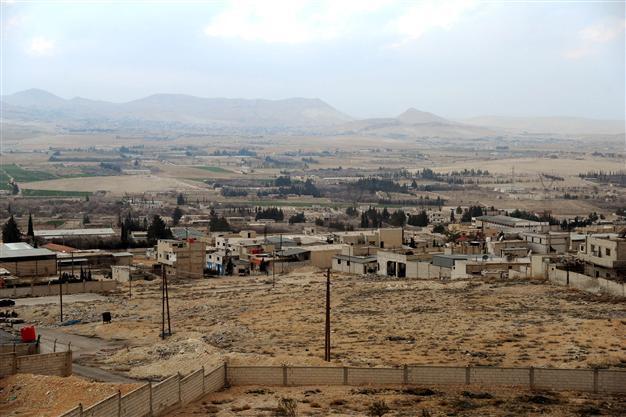Syria says rebel stronghold Yabrud seized by army
DAMASCUS - Agence France-Presse

A handout picture released on March 15, 2014, by the official Syrian Arab News Agency (SANA) reportedly shows the city of Yabrud after the Syrian army advanced in the key rebel bastion. AFP Photo
Syria's army, backed by fighters from Lebanon's Hezbollah movement, seized control of the rebel stronghold Yabrud on Sunday, state media said, dealing the opposition a heavy symbolic and strategic blow."Our brave armed forces have full control over Yabrud in Damascus province and are combing through the town and removing explosive devices placed by terrorists," state television said, citing a military source.
It broadcast images of dead fighters and its correspondent on the ground said traffic was moving normally along the nearby highway that links the capital Damascus to Syria's third city Homs.
Rami Abdel Rahman, director of the Syrian Observatory for Human Rights NGO, said government troops were in control of "most of the town, but fighting is still ongoing".
Opposition sources said civilians and activists in the town had fled overnight into neighbouring Lebanon.
And Syrian state television said the army was targeting "groups of terrorists" fleeing Yabrud between the village of Fleita in Syria and the town of Arsal just across the border in Lebanon.
The fall of Yabrud comes after months of Syrian army operations in the strategic Qalamun region, north of Damascus, where the town is situated.
Late last year, the army captured a string of nearby towns -- Qara, Deir Attiya and Nabuk -- as it extended its control in a southern sweep along the Damascus-Homs highway.
It then turned it sights to Yabrud, which has been a rebel bastion since early in the Syrian uprising that began in March 2011.
In addition to its symbolic importance, the town is a key strategic prize because of its proximity to the highway and the Lebanese border, across which rebels have smuggled fighters and weapons.
The capture of the town, and continuing army operations in the surrounding area, will sever important supply lines for the rebels as they face several army advances on different fronts.
The town's seizure is also likely to place new pressure on Lebanon's Arsal, just across the border, which is hosting tens of thousands of refugees that have fled the Qalamun region.
Sunni Arsal is largely sympathetic to the Sunni-led uprising, and rebel fighters are believed to have bases in areas around the town.
The Syrian air force has regularly carried out air strikes with war planes and helicopters targeting rebel positions around Arsal.
Yabrud was once home to some 30,000 residents, around 90 percent Sunni Muslim and 10 percent Christian.
Last year, Al-Qaeda affiliated rebels seized 13 nuns from the nearby Christian hamlet of Maalula and held them hostage in Yabrud.
The women were released on March 10 after lengthy negotiations mediated by a Lebanese security official that saw the government agree to release dozens of female prisoners in regime jails.
The Lebanese Shiite movement Hezbollah is believed to have played a key role in the army's recapture of Yabrud.
The group is a staunch ally of the Syrian regime and has dispatched some of its well-trained fighters to bolster the army's ranks.
Its involvement has prompted retaliatory bomb attacks by extremist groups against areas in Lebanon sympathetic to the movement. The attacks have mostly killed civilians.
Hezbollah and Lebanese security forces have alleged that many of the car bombs used in those attacks originated in Yabrud and were driven across the Lebanese border.
The army's capture of Yabrud comes a day into the fourth year of Syria's conflict, which began in March 2011 with peaceful anti-government protests but has spiralled into a brutal civil war.
More than 146,000 people have been killed, according to the Observatory, a Britain-based monitoring group and NGO, and millions have been displaced.
The UN's refugee agency says nine million Syrians have been forced from their homes, creating the world's largest displaced population.
More than 2.5 million Syrians are registered or awaiting registration as refugees in neighbouring countries, and in excess of 6.5 million people are displaced inside the country.
















